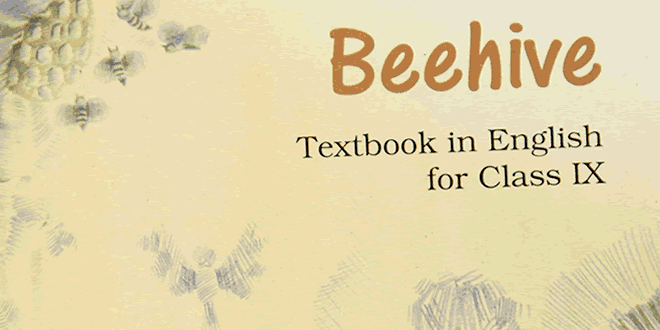Rain on the Roof: NCERT 9th Class CBSE English Beehive Chapter 03
Question: When the sky is covered with dark clouds and it starts raining, have you ever listened to the patter of soft rain on the roof? What thoughts flashed through your mind as you heard this melody of nature? Read the poem to find out what the poet dreamed of while listening to the rain.
Answer: Yes, I have often listened to the patter of the soft rain on the roof during the rainy season. This melody of nature brings to my mind the carefree days of my childhood, when I enjoyed playing in the rain with my friends.
Question:
- What do the following phrases mean to you? Discuss in class.
(i) Humid shadows
(ii) Starry spheres
(iii) What a bliss
(iv) A thousand dreamy fancies into busy being start
(v) A thousand recollections weave their air-threads into woof - What does the poet like to do when it rains?
- What is the single major memory that comes to the poet? Who are the “darling dreamers” he refers to?
- Is the poet now a child? Is his mother still alive?
Answer:
- (i) “Humid shadows” refer to the dark clouds that produce rain.
(ii) “Starry spheres” refer to the night sky abounding in stars.
(iii) The phrase “what a bliss” refers to an extremely happy and heavenly feeling.
(iv)This refers to the various imaginary thoughts and fantasies that are aroused in the poet’s mind.
(v) This phrase means that numerous memories intermingle to form a beautiful picture that the poet recollects. - When it rains, the poet feels delighted to lie with his head pressed against the pillow of his cottage chamber bed and listen to the patter of the soft rain.
- The single major memory that comes to the poet is that of his mother and her fond look.
The “darling dreamers” are the poet and his siblings in their childhood when they were lovingly put to sleep by their mother. - No, the poet is not a child now.
The fact that the poet recollects with fondness his mother’s memories connote her absence. However, it is difficult to state whether she is dead or she is merely not staying with the poet any longer.
Question:
- When you were a young child, did your mother tuck you in, as the poet’s did?
- Do you like rain? What do you do when it rains steadily or heavily as described in the poem?
- Does everybody have a cosy bed to lie in when it rains? Look around you and describe how different kinds of people or animals spend time, seek shelter etc. during rain.
Answer:
- Yes, my mother used to tuck me in when I was a young child, just like the poet’s mother did.
- Yes, I like the rain. I love to feel the raindrops on my face; it rejuvenates my senses. During the rain, I enjoy spending time with my family, sitting under the shelter on the terrace.
- No, everybody is not fortunate enough to have a cosy bed to lie in when it rains. Not everybody gets to enjoy the comfort of cosy homes during rain. I have seen animals seeking shelter under trees and under the tin roofs of the small roadside tea stalls. The people passing by shoo away these animals and try to shrink themselves under the limited space of these shops. The poor animals are left shivering and drenching on the roads. The shopkeepers of such stalls are delighted as the people waiting for the rain to subside often end up buying tea and snacks.
Question: What is a ‘bliss’ for a poet in the poem?
Answer: The poet loves rain because it carries him in old memories. He thinks it is bliss to hear the sound of the rain on the roof. He lies in his cozy bed and enjoys the music of nature. It is a bliss for him.
Question: What shows that the poet loved his mother?
Answer: The poet loved his mother. He remembered her when he lied on his cozy bed to enjoy the sound of rain. It appeared to him as if she was fondly looking at him.
Question: When does the ‘thousand dream fancies’ begin to weave in the poet’s mind?
Answer: When the poet is in his cottage and lies in his cozy bed listening to the soft music of rain on the roof, his mind is flooded with memories of his mother. He recalls his childhood.
Question: How does the memory of his mother haunt the poet?
Answer: During the pattering sound of the rain falling on the roof, the memory of his mother haunts the poet. This memory has been haunting him quite often like every darling dreamer. His mother is no more. But he still feels her fondness of looking on him. He remembers her while writing his song of rain.
Question: How does the poet enjoy the patter of the soft rain lying in his cottage-chamber bed?
Answer: The poet is lying in his cottage-chamber bed. He watches the humid shadows hovering the starry sky. He feels the melancholy darkness gently weeping in the form of rain drops. Pressing his pillow, he is listening to the patter of the soft raindrops falling on the roof of the cottage.
Question: What finds an echo in the poet’s heart and what starts weaving in his mind?
Answer: When the drops of rain fall on shingles, they make a tinkling sound. The tinkling sound echoes his heart. A thousand old memories weave their air-threads into pattering sounds. Lying in his bed, the poet is listening to the pattering sound of the rain falling on the roof.
Question: How is the rain a bliss for the poet? Describe.
Answer: The poet has developed a deep attachment with the rain. When it rains, he desires to lie on his cozy bed and enjoy the falling of rain drops on the roof. There is some specific reasons for it. When he hears the pattering of rain drops, the sweet memories of his childhood evaporate in his heart. He becomes nostalgic and remembers his mother. The picture of his mother reels over his eyes. He recalls how his mother had liking for sweet dreams. Besides, the poet forgets his worries and becomes filled with new hopes and aspirations. Hence, the rain is a bliss for the poet.
Question: Describe the various sights and sounds of the falling rain and recollections it brings to the poet.
Answer: Humid showers hover over all the starry sky. The melancholy darkness gently weeps in the form of rain drops. The rain creates an echo in his heart. It also brings thousand dreamy fancies alive to his mind. The poet listens to the patter caused by the sounds of the raindrops on the roof. At this moment the memory of his mother comes alive into his mind. His mother is no more but the memory is still alive. He still feels her fondness of looking on him. The memory is still fresh while he is writing this song of rain. He also listens to the sound of the rain falling upon the shingles.
Question: What virtue do you find in the sound of rains?
Answer: The sound of rain is pleasing to the ear. When we hear this sound, we forget everything. We find ourselves in the world of fancies. We remember the sweet memories of the past in a peaceful heart. Of course, we are unable to forget such moments of life. We must take this lesson from the rain and create peace in the mind of people by our behaviour.
Question: How can the sweet moments of life help us?
Answer: When we remember the sweet moments of life, we forget every pain. Riches have no meaning. We can feel pleasure even in a cottage. In fact, when there is no peace in our heart, we cannot lead a peaceful life. Sweet moments refresh our brain and fill us with new energy. So, the sweet moments of life are the treasure of energy for us.
Read the extracts given below and answer the questions that follow:
Question: Now in memory comes my mother
As she used in years agone,
To regard the darling dreamers Ere she left them till the dawft:
Oh! I feel her fond look on me As I list to this refrain Which is played upon the shingles By the patter of the rain.
- Which sound is the poet listening to?
- The sound reminds the poet of
- Which word in the extract means “the ability to remember things”?
Answer:
- The poet is listening to the sound of the rain.
- His mother.
- Memory.
Question: Now in memory come my mother,
As she used in years agone,
To regard the darling dreamers Ere she left them till the dawn;
Oh ! I feel her fond look on me
As I list to this refrain.
Which is played upon the shingles By the patter of the rain
- What is the memory that comes to the poet?
- Who are the darling dreamers he refers to?
- Trace a word from the extract that means “rectangular wooden tiles”.
Answer:
- It is the memory of his mother that comes to his mind.
- The darling dreamers, he refers to, are those lovely dreamers who remember their mothers.
- Shingles.
Question: Every tinkle on the shingles Has an echo in the heart And a thousand recollections Weave their air threads into woof As I listen to the patter Of the rain upon the roof
- How does the poet describe the falling rain?
- What does the mind of the poet fancy?
- Trace a word from the extract that means “memories”.
Answer:
- The poet says that the falling rain creates immense pleasure in his heart.
- Old thoughts and memories are recollected by the poet.
- Recollections!
Question: When the humid shadows hover.
Over all starry spheres
And the melancholy darkness
Gently weeps in rainy tears,
- What are the humid shadows?
- What do they do?
- Why does the poet call darkness melancholy?
Answer:
- The humid shadows are the dark clouds.
- They hide the stars and rain.
- The poet calls darkness melancholy because it makes him sad.
Question: Now in memory comes my mother,
As she used in years agone,
To regard the darling dreamers,
Ere she left them till the dawn:
Oh! I feel her fond look on me As I list to this refrain Which is played upon the shingles By the patter of the rain.
- Who comes in the memory of the child when it rains?
- What does the poet like to do when it rains?
- Find the word in the extract that refers to “repeated sound of the rain”.
Answer:
- When it rains, the child is reminded of his mother.
- When it rains, the poet feels happy to press the pillow of his bed and lie listening to the patter of the rain.
- Refrain.
Question: How does the poet describe the sky before the rain falls?
Answer: There were dark clouds hovering around in the sky. They hid the stars with darkness all around. The poet compares the darkness with sadness, as these humid shadows gently weep which pours down rainy tears.
Question: Do you think that the poem, Rain on the Roof, is lauding the healing power of nature’s rain?
Answer: The poet is appreciating rain, especially when he hears it from a cozy bed in a lovely cottage. This rain and its sound have resurrected the fondest memory of the poet’s mother in his mind. As the rain continues, the poet tries to recollect all that caused him pain, yet at the same time lifted his spirits.
Question: What does the each sound of shingle create?
Answer: Every raindrop on the tiles of the roof creates a rhythm with the poet’s heartbeat. This evokes thousands of dreams making his thoughts busy. While he focuses on the listening to the pitter-patter on the roof, his mind starts weaving recollections of fond memories of yesteryears.
Question: Who all does the poet remember while listening to the rain?
Answer: The poet remembers his mother who use to put him to bed every night and then used to look at him lovingly while he slept. He also remembers his angelic sister who died early. He also remembers the young girl whom the poet had admired at some point of time in-his life.
Question: Is the poet, Coates Kinney, able to enjoy the rain or he reminisces at the lost time?
Answer: The general atmosphere of the poem is very somber. There is darkness around but rain compensates it with the spirit of peace for the lonely night at hand. The poet realizes how much joy and pleasure of sleep he can attain when his head presses against his pillow to conclude the long day into a good nights rest.
Question: What happens when the poet listens to the patter of the rain? Do you think that rain is a narrative tool in the poet’s life?
Answer: The raindrops play music on the roof and create a sound of pitter-patter. To the poet this music is blissful. At die beginning of the poem there is certain tinge of sadness around which starts to weep away with the coming of raindrops. Every raindrop on the tiles of the roof creates a rhythm with the poet’s heartbeat. The poet tries to focus on listening to the pitter-patter on the roof whereas his mind weaves the recollections of fond memories of yester years.
Rain bears a subtle link with all aspects of life. It serves as a powerful narrative tool in the poet’s life. It has added a layer of depth and fullness to the situation where the poet is concerned. It delivers an effective voice which communicates the apt moment of time and space as well as the emotions of the protagonist in a more poignant manner than mere words would do.
Question: There is an image of past in the poem, ‘Rain on the Roof’. Is this imagery similar to ones used in the poem, ‘The Road not Taken’? Explain.
Answer: In the poem, ‘Rain on the Roof’, past is being spoken about but not in terms of regret or sadness whereas in the poem, ‘The Road Not Taken’, there is sadness and regret as imagery. Rain lulls the poet into dreams which bring back the memory of his family and the loved ones.
In the poem, ‘The Road Not Taken’, the poet is regretting his decision that he took years back. There is an imagery of past in both the poem but in the poem by Coates Kinney, this past imagery is the wonderful thought of a loving mother whereas, in the poem by Robert Frost, the poem is about regret. The road not taken symbolizes the choice to enter the unchartered land. It suggests that in making this choice he is trying to distinguish himself from the rest of the world by taking the less travelled, less worn road. Both the poems have the imagery of past. One creates a sense of love and want and create a somber mood. The other poem delves into the decision making power of the poet which took him places but could not satisfy him.
Question: Dreams hold importance in the poet’s life. Is it true? Explain.
Answer: This poem is depicting the overall mood on a rainy night. During night the humid cloud full of water creates dark shadows over the star studded sky. The poet dreams about his mother and the way she used to tuck him in bed. The poet’s dream of his mother reminds him of his childhood days. His mother used to tell stories to lull him into sleep full of dreams. The music being played on the rooftop is like the affectionate look by which his mother used to see him, while he was a kid. So dreams make him realize the importance of past and and the things that he now misses.
 Class Notes NCERT Solutions for CBSE Students
Class Notes NCERT Solutions for CBSE Students






